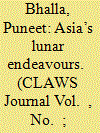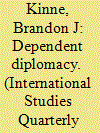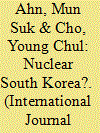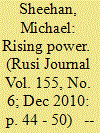|
|
|
Sort Order |
|
|
|
Items / Page
|
|
|
|
|
|
|
| Srl | Item |
| 1 |
ID:
139176


|
|
|
|
|
| Summary/Abstract |
Interest in the exploration of the Moon, much like its phases, has waxed and waned since the beginning of space exploration. The quest for the Moon was an integral part of the space race between the Soviets and the Americans in the 1960s and 1970s, which resulted in a total of 65 missions, including the six manned missions by the US, before they both shifted focus to manned space stations and missions to Mars. Strategically or militarily, the Moon did not offer them much advantage. Scientifically, there was not much that was expected to be revealed after the first few missions. Economically, there was no great rationale for continuing a high cost programme from which few commercial gains could be expected at the time. Mars offered more opportunities for national prestige, scientific discovery as well as mining prospects. In the next few decades, although there were periodic statements about the potential of lunar exploration, these did not translate into actual efforts by any space-faring nation.
|
|
|
|
|
|
|
|
|
|
|
|
|
|
|
|
| 2 |
ID:
133643


|
|
|
|
|
| Publication |
2014.
|
| Summary/Abstract |
Diplomatic recognition is an essential tool of statecraft but remains largely unanalyzed by political scientists. Two recent trends in diplomatic practice raise notable puzzles: (i) use of diplomatic ties to signal (dis)approval of a regime or its policies, based largely on cues from diplomatic partners, and (ii) reliance on diplomatic missions as a means of securing prestige in the international system. I argue that both trends are the result of network influences. States face resource constraints and must choose diplomatic partners wisely, but they lack complete information about the risks and benefits of extending diplomatic recognition. To solve this informational dilemma, they condition recognition on the diplomatic activity of others. First, states send missions to countries that host missions from their own diplomatic partners, which increases the strength of diplomatic signals and reduces political risks. Second, states send missions to countries that host large numbers of missions in general (that is, "prestigious" countries), which increases their capacity for information gathering. In general, a state's decision to extend or retract diplomatic recognition depends heavily on the decisions of other states. Employing novel network methodologies, I show that these endogenous network influences are among the most consistent and substantively powerful determinants of diplomatic recognition.
|
|
|
|
|
|
|
|
|
|
|
|
|
|
|
|
| 3 |
ID:
129547


|
|
|
|
|
| Publication |
2014.
|
| Summary/Abstract |
After North Korea's third nuclear test in February 2013, South Koreans are once again debating whether to go nuclear. Some advocates of South Korean nuclear possession argue that nuclear weapons are necessary for self-defence against the nuclear-armed North. Some support South Korea's nuclearization as leverage vis-à-vis North Korea and China. Some argue that going nuclear will heighten the South's national prestige. However, others counter that South Korea's nuclearization is not desirable and, indeed, barely feasible. First, since North-South conflicts have not diminished since the 1953 truce, the nuclear armament of the two Koreas could result in a nuclear war. Second, the South's nuclearization would only hasten North Korea's ardent pursuit of securing and increasing its stock of nuclear warheads. Third, it would prompt a fierce arms race in Northeast Asia by pressing Japan and Taiwan to go nuclear. Finally, it would undermine Seoul's close ties with Washington. In order to maintain a nuclear-free South Korea, the US needs to reinforce its nuclear umbrella and eradicate the North Korean nuclear threat through active and comprehensive negotiations with Pyongyang.
|
|
|
|
|
|
|
|
|
|
|
|
|
|
|
|
| 4 |
ID:
100638


|
|
|
|
|
| Publication |
2010.
|
| Summary/Abstract |
Asia's rising powers are developing indigenous space programmes at a startling pace. Though some hedging behaviour is apparent, most are designed to bolster technological autonomy and augment national prestige. Nevertheless, China and India are both pursuing anti-satellite capabilities. Not yet a full-blown race, both competition and cooperation is possible between Asia's giants.
|
|
|
|
|
|
|
|
|
|
|
|
|
|
|
|
|
|
|
|
|